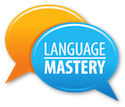As a language learning addict, I follow lots (and I mean lots) of polyglot blogs and podcasts. It is always interesting to see what has worked (and what hasn’t worked) for successful language learners. While most agree on the vast majority of language learning DOs and DON’Ts, there is one area that always seems to cause heated debate: input (i.e. listening and reading) versus language output (i.e. speaking and writing). Here’s where I throw down on the issue…
Learn MoreMost adults fail to learn a foreign language no matter how many years they sit in a classroom or live where the language is spoken because they spend nearly all of their study time learning “about” their target language instead of the language itself. This is the critical difference between “studying” and “learning”.
Learn MoreStever Robbins (a.k.a. The Get-it-done Guy), author of The Get-it-Done Guy’s 9 Steps to Work Less and Do More, has featured my language learning tips in the June 7, 2010 episode of his popular productivity podcast!
Learn More“Effectiveness is doing the things that get you closer to your goals. Efficiency is performing a given task (whether important or not) in the most economical manner possible. Being efficient without regard to effectiveness is the default mode of the universe.”
Learn MoreIn recent years, grammar mavens and traditional language educators have been up in arms against a perceived attack on “the righteous study of grammar”. These defensive claims always perplex me considering that nearly all language classes still spend the vast majority of class hours teaching and testing grammar rules…
Learn MoreLanguage schools can be a wonderful place to learn more about your target language, meet fellow learners (who can become both study partners or even lifelong friends), and get your linguistic and cultural feet wet before (or even while) immersing yourself in a new culture and foreign tongue.
However, language schools can also be a major impediment to the very goal you go there to achieve: learning a foreign language as quickly and efficiently as possible. This may come as a shock to those who have been conditioned to believe that classrooms are the only place, or at least the best place, to learn a language. Read on to see the top ten disadvantages of formal, classroom-based language learning.
The first thing I’d like to say about mind mapping is how upset I am for not knowing about it sooner! Why wasn’t it taught to me in elementary school, junior high, high school, or even university?...
Learn MoreTo do lists seem like a good idea in theory, but they have one major disadvantage: there is an infinite number of potential to do items. With this in mind, Timothy Ferriss, best-selling author of The 4-Hour Workweek (and a speaker of 6 languages), recommends “not to do lists” instead. Since they isolate a finite set of behaviors that are getting between you and your goals, they are far more effective than traditional to do lists. This tool applies perfectly to language learning, where most learners waste a lot of time on ineffective methods, bad materials, and counter-productive attitudes.
Learn More









